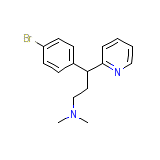Dimetane-ten




Dimetane-ten Brand names, Dimetane-ten Analogs
Dimetane-ten Brand Names Mixture
- Derma-4 Ont (Neomycin Sulfate + Nystatin + Thiostrepton (Antibiotic of a Streptomyces Species) + Triamcinolone Acetonide)
- Flagystatin (Metronidazole + Nystatin)
- Kenacomb Cream (Gramicidin + Neomycin Sulfate + Nystatin + Triamcinolone Acetonide)
- Kenacomb Mild Cream (Gramicidin + Neomycin Sulfate + Nystatin + Triamcinolone Acetonide)
- Kenacomb Mild Ointment (Gramicidin + Neomycin Sulfate + Nystatin + Triamcinolone Acetonide)
- Kenacomb Ointment (Gramicidin + Neomycin Sulfate + Nystatin + Triamcinolone Acetonide)
- Kenacomb Ont (Gramicidin + Neomycin (Neomycin Sulfate) + Nystatin + Triamcinolone Acetonide)
- Lidecomb Cream (Fluocinonide + Gramicidin + Neomycin Sulfate + Nystatin)
- Mecomb Crm 0.1% (Gramicidin + Neomycin (Neomycin Sulfate) + Nystatin + Triamcinolone Acetonide)
- Solvaderm Ointment (Neomycin (Neomycin Sulfate) + Nystatin + Thiostrepton (Antibiotic of a Streptomyces Species) + Triamcinolone Acetonide)
Dimetane-ten Chemical_Formula
C16H19BrN2
Dimetane-ten RX_link
No information avaliable
Dimetane-ten fda sheet
Dimetane-ten msds (material safety sheet)
Dimetane-ten Synthesis Reference
No information avaliable
Dimetane-ten Molecular Weight
319.24 g/mol
Dimetane-ten Melting Point
< 25 oC
Dimetane-ten H2O Solubility
Freely soluble (maleate salt)
Dimetane-ten State
Liquid
Dimetane-ten LogP
3.74
Dimetane-ten Dosage Forms
Elixir; Liquid; Tablet
Dimetane-ten Indication
For the treatment of the symptoms of the common cold and allergic rhinitis, such as runny nose, itchy eyes, watery eyes, and sneezing.
Dimetane-ten Pharmacology
Brompheniramine is an antihistaminergic medication of the propylamine class. It is a first-generation antihistamine. In allergic reactions an allergen interacts with and cross-links surface IgE antibodies on mast cells and basophils. Once the mast cell-antibody-antigen complex is formed, a complex series of events occurs that eventually leads to cell-degranulation and the release of histamine (and other chemical mediators) from the mast cell or basophil. Once released, histamine can react with local or widespread tissues through histamine receptors. Histamine, acting on H1-receptors, produces pruritis, vasodilatation, hypotension, flushing, headache, tachycardia, and bronchoconstriction. Histamine also increases vascular permeability and potentiates pain. Brompheniramine is a histamine H1 antagonist (or more correctly, an inverse histamine agonist) of the alkylamine class. It provides effective, temporary relief of sneezing, watery and itchy eyes, and runny nose due to hay fever and other upper respiratory allergies.
Dimetane-ten Absorption
Antihistamines are well absorbed from the gastrointestinal tract after oral administration.
Dimetane-ten side effects and Toxicity
Oral, rat: LD50 = 318 mg/kg. Signs of overdose include fast or irregular heartbeat, mental or mood changes, tightness in the chest, and unusual tiredness or weakness.
Dimetane-ten Patient Information
Dimetane-ten Organisms Affected
Humans and other mammals














